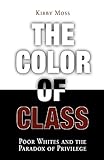The Color of Class : Poor Whites and the Paradox of Privilege / Kirby Moss.
Material type: TextPublisher: Philadelphia : University of Pennsylvania Press, [2010]Copyright date: ©2003Description: 1 online resource (176 p.)Content type:
TextPublisher: Philadelphia : University of Pennsylvania Press, [2010]Copyright date: ©2003Description: 1 online resource (176 p.)Content type: - 9780812218510
- 9780812200652
- 305.5/69/0973 21
- HV4045 .M67 2003eb
- online - DeGruyter
- Issued also in print.
| Item type | Current library | Call number | URL | Status | Notes | Barcode | |
|---|---|---|---|---|---|---|---|
 eBook
eBook
|
Biblioteca "Angelicum" Pont. Univ. S.Tommaso d'Aquino Nuvola online | online - DeGruyter (Browse shelf(Opens below)) | Online access | Not for loan (Accesso limitato) | Accesso per gli utenti autorizzati / Access for authorized users | (dgr)9780812200652 |
Browsing Biblioteca "Angelicum" Pont. Univ. S.Tommaso d'Aquino shelves, Shelving location: Nuvola online Close shelf browser (Hides shelf browser)

|

|

|

|

|

|

|
||
| online - DeGruyter Ennobling Love : In Search of a Lost Sensibility / | online - DeGruyter Postmodern Fairy Tales : Gender and Narrative Strategies / | online - DeGruyter Cross-Border Marriages : Gender and Mobility in Transnational Asia / | online - DeGruyter The Color of Class : Poor Whites and the Paradox of Privilege / | online - DeGruyter Astrofuturism : Science, Race, and Visions of Utopia in Space / | online - DeGruyter Lives in Translation : Sikh Youth as British Citizens / | online - DeGruyter Red Matters : Native American Studies / |
Frontmatter -- Contents -- Introduction -- 1 Setting: Midway, U.S.A., an Unassuming City? -- 2 School: Learning to Live Up to the Paragon -- 3 Encounters: Intersections and Collisions -- 4 Income and Work: Making Ends Meet, Barely -- 5 Encounters: Changing Contexts, Changing Characters -- 6 Home: Sheltered by Whiteness -- 7 Encounters: Uncommon Class Commonalities -- 8 Deconstructing the Color of Class -- Conclusion -- Notes -- References -- Index -- Acknowledgments
restricted access online access with authorization star
http://purl.org/coar/access_right/c_16ec
"Even though we lived a few blocks away in our neighborhood or sat a seat or two away in elementary school, a vast chasm of class and racial difference separated us from them."-From the IntroductionWhat is it like to be white, poor, and socially marginalized while, at the same time, surrounded by the glowing assumption of racial privilege? Kirby Moss, an African American anthropologist and journalist, goes back to his hometown in the Midwest to examine ironies of social class in the lives of poor whites. He purposely moves beyond the most stereotypical image of white poverty in the U.S.-rural Appalachian culture-to illustrate how poor whites carve out their existence within more complex cultural and social meanings of whiteness. Moss interacts with people from a variety of backgrounds over the course of his fieldwork, ranging from high school students to housewives. His research simultaneously reveals fundamental fault lines of American culture and the limits of prevailing conceptions of social order and establishes a basis for reconceptualizing the categories of color and class.Ultimately Moss seeks to write an ethnography not only of whiteness but of blackness as well. For in struggling with the elusive question of class difference in U.S. society, Moss finds that he must also deal with the paradoxical nature of his own fragile and contested position as an unassumed privileged black man suspended in the midst of assumed white privilege.
Issued also in print.
Mode of access: Internet via World Wide Web.
In English.
Description based on online resource; title from PDF title page (publisher's Web site, viewed 24. Apr 2022)


